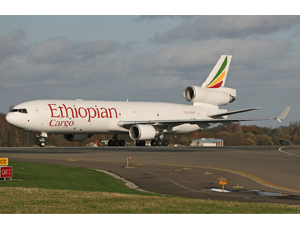
Despite recent declines in air cargo activity throughout Africa and forecasts predicting only minimal increases, major airports across the region are launching terminal projects in anticipation of rebounding global economic activity. Developments in Ethiopia, Nigeria, Uganda, Angola and Ghana are among those now moving into construction.
In January, Ethiopian Airlines announced it had signed a $148-million turnkey contract with Unitechnik Systems GmbH and Varnero Construction for construction of a second cargo terminal and apron at Addis Ababa Bole International Airport. According to the airline, the terminal—to be constructed over the next two years—will have capacity for 600,000 tons of annual cargo, with apron parking capacity for five Boeing 747 aircraft. The project will double the airport’s existing freight cargo capacity, to 1.2 million tons annually. At the same time, Ethiopian Airlines announced plans to build a third cargo terminal at the airport following the completion of the current project.
Ethiopian Airlines Group CEO Tewolde GebreMariam stated, "Construction of the two cargo terminals shows our unwavering commitment to support Ethiopia’s fast-growing export of agricultural products and high-value imports to the continent, which are critically important for economic development of many African countries."
Addis Ababa-based Varnero Construction will lead the terminal’s construction, while Unitechnik will oversee installation of equipment, such as conveyors, high-rack storage systems and electronic systems. Ethiopian Cargo, the freight business arm of Ethiopian Airlines, will manage the terminal facility. The company is among the largest cargo service providers in Africa.
Growing Trend
To date, groups such as the International Air Transport Association (IATA) are projecting only slight increases in freight transportation activity. Also, Boeing recently forecast that it expects to see its Africa-to-Europe market average 3.9% growth per year. The company cited efforts by African airlines to explore new business models and the development of intraregional hubs as factors in its growth forecast.
Despite the modest predictions, several projects are moving ahead.
In Angola, Brazil-based contractor Odebrecht is working with the China International Fund on the construction of a $300-million Angola International Airport project, featuring a 67,000-sq-ft cargo terminal with annual capacity of more than 38,000 tons. Additionally, the airport will have runways measuring either 3,800 meters or 4,200 m in length—long enough to accommodate the largest commercial airliners.
In Ghana, China Airport Civil Construction will build a cargo terminal as part of Ghana Airport Co.’s new international airport at Prampram.
Additionally, Africa’s largest oil producer, Nigeria, announced plans for new cargo terminals at all 12 of the country’s airports, according to Yakubu Dati, general manager of the Lagos-based Federal Airports Authority of Nigeria (FAAN).
"Our airports are being rebuilt to provide means for exporting perishable and non-perishable agricultural output to remove waste, save time and increase farmers’ income,” Dati said in a January interview with Bloomberg. “We have a situation at present where cargo planes fly into the country and fly out empty," he added.
Additionally, future air-cargo terminal projects are anticipated after Sudan completes its planned New Khartoum International Airport and when Tanzania and Uganda complete upgrades to Julius Nyerere International Airport and Entebbe Airport, respectively.

Post a comment to this article
Report Abusive Comment